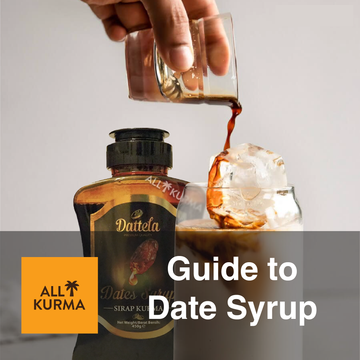Going sweet on Date Syrup
Is sugar your dietary weakness? Many people crave it. But even if you don't necessarily have a sweet tooth, it can be tough to avoid sugar in food or drink altogether.

There are two sugars that you should pay attention to - glucose and fructose.
Glucose is a simple sugar which is often added to processed foods in the form of dextrose, which is extracted from cornstarch. Fructose, or "fruit sugar", is naturally found in fruit, honey, agave and most root vegetables. It is commonly added to processed foods in the form of high-fructose corn syrup.
While some consider fructose to be healthier than glucose, as it originates from fruits, too much of it can have a negative effect on our health. Fortunately, a wide range of sugar substitutes and sweeteners - both natural and artificial - are available to help reduce the amount of table sugar in your diet.
Limiting sugar intake is especially important for older adults. Excessive added sugar consumption may lead to obesity, type 2 diabetes, and heart disease.
It has also been linked to poor cognitive function, affecting memory and increasing the risk of dementia.
Here is how Dates Syrup can be one of the foods that are good for consumption as a sugar substitute.
Benefits of Date Syrup
Date syrup, which is made by extracting the juice of dates, is also one of the best alternatives to refined sugar. This thick, dark brown and super-sweet liquid is commonly used for cooking in the Middle East, to add flavour to everything from chicken dishes to desserts.
It is packed with nutrients like magnesium, phosphorus and zinc. It also has an antioxidant level equal to raisins and raspberries, making it the most nutritionally dense sweetener out there. The potassium in date syrup actually helps your body slowly absorb and regulate sugar in the bloodstream.
Because it is a natural sweetener and made from dates, date syrup is also suitable for those following a specialised diet, such as a paleo diet or a vegan diet. It is also good for those who are on a low-sugar or zero-sugar diet, including diabetics, as it is low on the glycemic index.
Date syrup also contains phenolic compounds that help prevent a number of bacterial infections. Their antibacterial properties have been found to be more effective than the compounds contained in manuka honey, which has long been touted for its ability to prevent infections and heal small wounds.
Best of all, while honey is not recommended to be given to babies under 12 months, date syrup is suitable as a natural sweetener for baby food. Let's explore some other culinary uses for date syrup. (Premium quality Dates Syrup)
Date syrup in your food and drink
Date syrup's liquid nature and versatility makes it suitable as a replacement for processed sugar and artificial sweeteners in most recipes. Here are some of our favourites:
1. To sweeten coffee, latte or hot milk drinks. Instead of adding sugar, just stir in a teaspoon or two of date syrup for a rich, caramel-like flavour.
2. Add a zing to overnight oats. The next time you prepare a batch of healthy, nutritious overnight oats, instead of honey, add date syrup to your yogurt before adding your choice of fruits and nuts.
3. Have it for breakfast. Replace your usual honey or maple syrup with date syrup for a richer, sweeter start to your day. Try it drizzled over pancakes, or together with French toast.
4. Pair it with Middle Eastern dishes. Mix some date syrup and tahini to create dibis w'rashi, a natural sweet dip.
5.Ice-cream upgrade. Have a ‘double date' treat when you serve plain vanilla ice-cream with chopped dates and a few drizzles of date syrup. It is truly a delight to be savoured, especially in our tropical weather.
Conclusion
Not only is Date Syrup a healthy, all-natural sweetener, it can be added to a variety of meals. The next time you want to add a little more sweetness to your life, just slip in some date syrup to bring a smile to your face.You can learn more about date syrup and find other natural sweet snacks by clicking here.
Sources:
https://www.earthseats.com/blogs/blogs/date-syrup-nutrition-facts
https://ilovedatelady.com/blogs/blog/everything-about-date-syrup
https://www.healthline.com/nutrition/sucrose-glucose-fructose
https://www.sciencealert.com/date-syrup-could-fend-off-bacterial-infections
https://parenting.firstcry.com/articles/dates-syrup-for-babies-natural-sweetener-for-infant-food/
https://blog.joolies.com/10-ways-to-use-joolies-date-syrup






